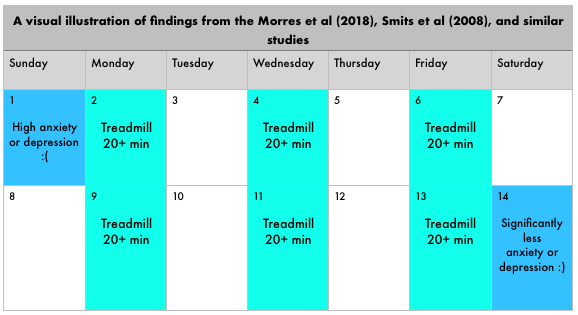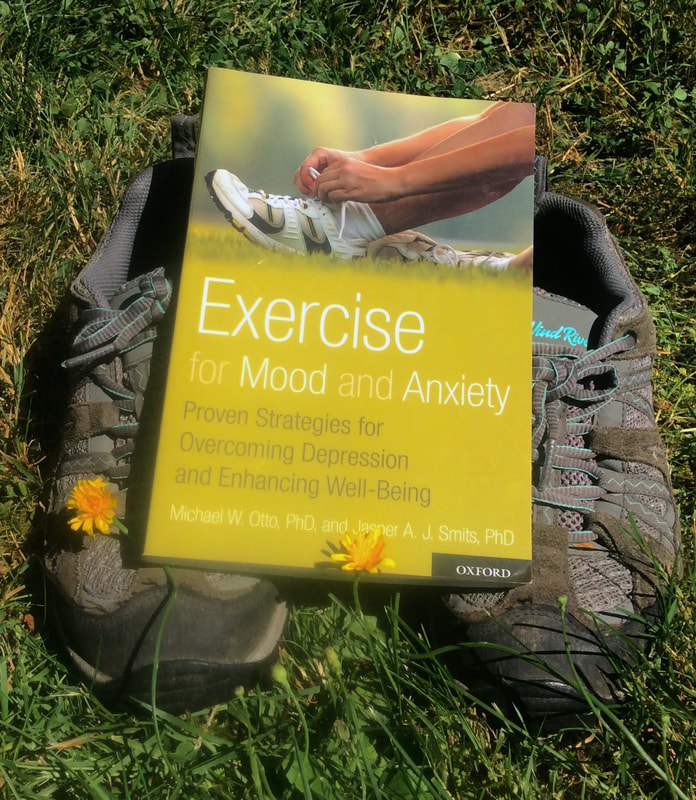"If Exercise were a Pill, everyone would be taking it."Gif credit: Jamie Farrell My husband and I brought our son on his first wilderness canoeing trip this week (he fell asleep -- until I accidentally splashed him!) I am instructing a few day kayaking programs this summer, as well as updating the MHWFA curriculum for the fall, and reflecting how meaningful it is to make time for movement in supporting good mental health. As a seasonal kayak guide for 15 years, working physically every day outdoors did a world of good for my mood and anxiety levels as well (October was always a different story!). So, this newsletter is dedicated to the mental health benefits of exercise. There is no shortage of scientific research on the mental health benefits of regular exercise. Regular aerobic exercise is one of the most effective treatments (with few side effects) available for mild to moderate depression, and it also has been found to improve the effectiveness of other interventions such as antidepressant medications and cognitive behaviour therapy. And not just mood disorders: exercise has been found effective for treating those with post-traumatic stress disorder and schizophrenia as well as anxiety disorders. In a particularly memorable study, assigning individuals to a routine of just three 20-minute treadmill sessions per week for two weeks was sufficient to result in clinically decreased levels of anxiety. Many of our MHWFA students are folks who work outside or physically in some way: treeplanters, SAR volunteers, outdoor educators, traditional medicine gatherers. For some people, 20 minutes of exercise three times per week feels like a lot! At the same time, remote area living/working/playing frequently involves more than 20 minutes per day of physical activity. So, two things for our students:
0 Comments
I was delighted when I found this book during my Master's studies, as I recognized the names of the authors from many of the scientific articles I was compiling at the time for my final thesis project.
Smits and Otto, both PhDs, do a great job offering an incredible amount of clinical knowledge in an easily accessible, helpful format. Reading this book feels much like a conversation with a personal coach, walking you through some great research on the science of exercise and mood as well as a plan for setting up and maintaining the motivation for your own exercise routine. There are short, fill-in workbook style exercises for you to complete about your own exercise journey, and snippets and anecdotes about "regular Joes" and professional athletes -- many of whom struggle with mental health and motivation, too. They explore the science of motivation, warn you about excuses that come up and problem-solve ahead of time for how to avoid them: When you are down, blue, or sad, it is sorely tempting to skip a workout. But, as you hear yourself say, "I don't feel like it," remember that this is the very time at which exercise is most likely to help. Choosing not to exercise because you are feeling down is like choosing not to take an aspirin because you have a headache. (91) MHWFA students will recognize a combination of psychoeducation, cognitive behaviour, and "solution-focused conversation" techniques in a book that is nicely practical as well as theoretical. And for those of us who work seasonally, this may be just the right tool to help you develop your awareness for how the changing seasons can affect your own mental health, and put together a plan for the coming year. Note: I don't use affiliate links, and the Recommended Resources section is not sponsored. I (Daye) only tell you about books I have actualy found useful professionally or personally. |
Details
AuthorDaye Cooper Hagel is a clinical counsellor, veteran wilderness guide, and director of the Mental Health Wilderness First Aid program on the west coast of British Columbia, Canada. Read more about her and the MHWFA on the About Us page! Archives
July 2022
Categories |
About Us |
Courses & Events |
|
|
We do not require personal medical information from our students, volunteers,
staff, or contractors as a condition of providing services. |





 RSS Feed
RSS Feed
